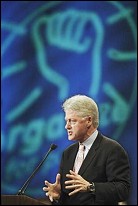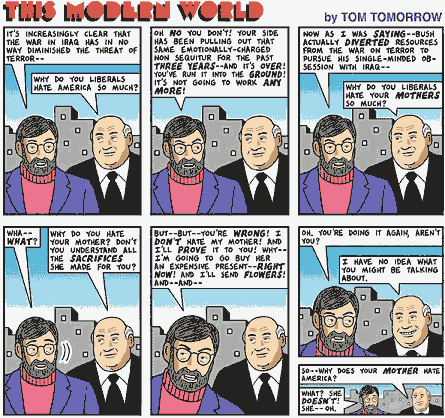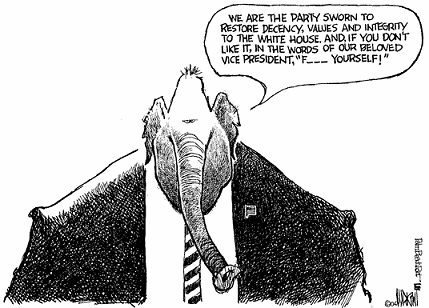 'Mob Boss' Trump's Global Trade Sanctions Tank U.S., World Markets: 'BradCast' 4/3/25
'Mob Boss' Trump's Global Trade Sanctions Tank U.S., World Markets: 'BradCast' 4/3/25 'Green News Report' 4/1/25
'Green News Report' 4/1/25|
w/ Brad & Desi
|
 |
 Dems Step Up: Crawford Landslide in WI; Booker Makes History in U.S. Senate: 'BradCast' 4/2/25
Dems Step Up: Crawford Landslide in WI; Booker Makes History in U.S. Senate: 'BradCast' 4/2/25 Judge Dismisses Long-Running Challenge to GA's Unverifiable, Insecure E-Vote System: 'BradCast' 4/1/25
Judge Dismisses Long-Running Challenge to GA's Unverifiable, Insecure E-Vote System: 'BradCast' 4/1/25 'Green News Report' 4/1/25
'Green News Report' 4/1/25|
w/ Brad & Desi
|
 |
 Bad Court and Election News for Trump is Good News for America: 'BradCast' 3/31/25
Bad Court and Election News for Trump is Good News for America: 'BradCast' 3/31/25 Sunday 'Great Start!' Toons
Sunday 'Great Start!' Toons
 Vets Push Back at Trump, Musk Plan to Slash Health Care, 80K V.A. Jobs: 'BradCast' 3/27/25
Vets Push Back at Trump, Musk Plan to Slash Health Care, 80K V.A. Jobs: 'BradCast' 3/27/25 'Green News Report' 3/27/25
'Green News Report' 3/27/25|
w/ Brad & Desi
|
 |
 Signal Scandal Worsens for Trump, GOP; Big Dem Election Wins in PA: 'BradCast' 3/26
Signal Scandal Worsens for Trump, GOP; Big Dem Election Wins in PA: 'BradCast' 3/26 'Emptywheel' on Why Trump NatSec Team Should 'Resign in Disgrace' After Signal Chat Debacle: 'BradCast' 3/25/25
'Emptywheel' on Why Trump NatSec Team Should 'Resign in Disgrace' After Signal Chat Debacle: 'BradCast' 3/25/25 'Green News Report' 3/25/25
'Green News Report' 3/25/25 USPS 'Belongs to the People, Not the Billionaires': 'BradCast' 3/24/25
USPS 'Belongs to the People, Not the Billionaires': 'BradCast' 3/24/25 Sunday 'Suddenly Conceivable' Toons
Sunday 'Suddenly Conceivable' Toons
 'Green News Report' 3/20/25
'Green News Report' 3/20/25-
'What Cld a Russian Asset Do That Trump Hasn't?': 'BradCast' 3/6/25

-
The Longest, Dullest, Most Lie-Filled 'SOTU' Ever: 'BradCast' 3/5/25

-
Trump's Bad for Biz... Farmers... Nat'l Parks...: 'BradCast' 3/4/25

-
Trump Targets SSA with 50% Cuts, Office Closures: 'BradCast' 3/3/25

-
Defending Free Press Against White House (& Bezos): 'BradCast' 2/27

-
Waste, Fraud and Abuse by Trump, Musk, DOGE: 'BradCast' 2/26/25

-
Bad Day for Musk is Good Day for US (& World): 'BradCast' 2/25/25

|
BARCODED BALLOTS AND BALLOT MARKING DEVICES
BMDs pose a new threat to democracy in all 50 states...
| |
|
VIDEO: 'Rise of the Tea Bags'
Brad interviews American patriots...
|
'Democracy's Gold Standard'
Hand-marked, hand-counted ballots...
|
(All times listed as PACIFIC TIME unless noted)
- DAILY!: The BradCast on KPFK/Pacifica Radio Network (90.7FM Los Angeles, 98.7FM Santa Barbara, 93.7FM N. San Diego and nationally on many other affiliate stations!) | ALSO VIA Podcast RSS/XML feed | Pandora | TuneIn | Apple Podcasts/iTunes | iHeart | Amazon Music

|
GOP Voter Registration Fraud Scandal 2012...
|
 VA GOP VOTER REG FRAUDSTER OFF HOOK
VA GOP VOTER REG FRAUDSTER OFF HOOK
 Criminal GOP Voter Registration Fraud Probe Expanding in VA
Criminal GOP Voter Registration Fraud Probe Expanding in VA
 DOJ PROBE SOUGHT AFTER VA ARREST
DOJ PROBE SOUGHT AFTER VA ARREST
 Arrest in VA: GOP Voter Reg Scandal Widens
Arrest in VA: GOP Voter Reg Scandal Widens
 ALL TOGETHER: ROVE, SPROUL, KOCHS, RNC
ALL TOGETHER: ROVE, SPROUL, KOCHS, RNC
 LATimes: RNC's 'Fired' Sproul Working for Repubs in 'as Many as 30 States'
LATimes: RNC's 'Fired' Sproul Working for Repubs in 'as Many as 30 States'
 'Fired' Sproul Group 'Cloned', Still Working for Republicans in At Least 10 States
'Fired' Sproul Group 'Cloned', Still Working for Republicans in At Least 10 States
 FINALLY: FOX ON GOP REG FRAUD SCANDAL
FINALLY: FOX ON GOP REG FRAUD SCANDAL COLORADO FOLLOWS FLORIDA WITH GOP CRIMINAL INVESTIGATION
COLORADO FOLLOWS FLORIDA WITH GOP CRIMINAL INVESTIGATION
 CRIMINAL PROBE LAUNCHED INTO GOP VOTER REGISTRATION FRAUD SCANDAL IN FL
CRIMINAL PROBE LAUNCHED INTO GOP VOTER REGISTRATION FRAUD SCANDAL IN FL
 Brad Breaks PA Photo ID & GOP Registration Fraud Scandal News on Hartmann TV
Brad Breaks PA Photo ID & GOP Registration Fraud Scandal News on Hartmann TV  CAUGHT ON TAPE: COORDINATED NATIONWIDE GOP VOTER REG SCAM
CAUGHT ON TAPE: COORDINATED NATIONWIDE GOP VOTER REG SCAM
 CRIMINAL ELECTION FRAUD COMPLAINT FILED AGAINST GOP 'FRAUD' FIRM
CRIMINAL ELECTION FRAUD COMPLAINT FILED AGAINST GOP 'FRAUD' FIRM
 RICK SCOTT GETS ROLLED IN GOP REGISTRATION FRAUD SCANDAL
RICK SCOTT GETS ROLLED IN GOP REGISTRATION FRAUD SCANDAL
 VIDEO: Brad Breaks GOP Reg Fraud Scandal on Hartmann TV
VIDEO: Brad Breaks GOP Reg Fraud Scandal on Hartmann TV RNC FIRES NATIONAL VOTER REGISTRATION FIRM FOR FRAUD
RNC FIRES NATIONAL VOTER REGISTRATION FIRM FOR FRAUD
 EXCLUSIVE: Intvw w/ FL Official Who First Discovered GOP Reg Fraud
EXCLUSIVE: Intvw w/ FL Official Who First Discovered GOP Reg Fraud GOP REGISTRATION FRAUD FOUND IN FL
GOP REGISTRATION FRAUD FOUND IN FL

|
The Secret Koch Brothers Tapes...
|

| MORE BRAD BLOG 'SPECIAL COVERAGE' PAGES... |
 By the time Friday rolled around, all showings in the area were sold out, and, of course, the Rightwing commentators had sold out long ago. Their breathless, panicked "debunkings" and attacks were as patriotic as they were on the mark. Which is to say, not even close on both counts.
By the time Friday rolled around, all showings in the area were sold out, and, of course, the Rightwing commentators had sold out long ago. Their breathless, panicked "debunkings" and attacks were as patriotic as they were on the mark. Which is to say, not even close on both counts.
We did, however, manage to find a theater some 40 minutes away where tickets to a late showing were available. Thankfully, we purchased online, because by the time we arrived at the theater, thirty minutes before it was to begin, the showing, and the midnight one that followed it, had already sold out.
Fahrenheit 9/11 is both a remarkable and landmark film --- as will become self-evident as the years march on. It's timing is simply extraordinary, as I marvelled more than once while watching on the enormous screen what it seems as though I'd just seen only weeks before while sipping my coffee on a Sunday morning while watching Meet the Press. But in this context, through Moore's eyes, instead of NBC's or Fox's or CNN's, the familiar footage looked somehow different.
True enough, this film is agit-prop in it's most robust and commercially viable form. But to my surprise and delight, it's also one hell of a piece of filmmaking.
From the simmering, surreal and ominous tone of the opening credits, a collection of satellite feeds of some of the "Major Players" (Bush, Ashcroft, Wolfowitz, Rice) being puffed and primped as they prepare to play their parts on the Media's Worldwide Stage, it's clear that this is more than hype --- it's actual cinema.
Having figured before hand that I'd already be well familiar with most of what I'd be shown, I quickly learned that Moore was, as usual, ahead of the curve. His game was bigger than mine. Bigger than the petty pundits who dutifully discredited the film before release, and before they had bothered to actually see it. Bigger than any of Moore's previous notable "documentaries".
He had more than just Bush Bashing in mind. He had a work of cinematic art to give us, which incidentally also ends up accusing just about everybody in the modern world for their part in the fine mess we now find ourselves in.
His "Op/Ed", as he described it last week on This Week is a case built carefully and deliberately brick by brick. One may find themselves wishing that the bricks would come slower in the film's first act, or perhaps it was simply a hope that the bricks couldn't possibly add up to where they seemed to be building.
In either case, these bricks are precisely what the Moore critics have tried --- so far unsuccessfully to my knowledge --- to break apart. And the truth soon becomes evident that any two or three or four bricks could easily be removed, and Moore's case would still remain as powerful. The reverberations will be felt for years.
In other words, Moore's case is larger than any number of airplanes full of Saudis secretly whisked out of the country by the Bush Administration in the days following 9/11 and subsequently denied by same for years. Larger than the silly notion of who within the Bush Administration approved such flights. Larger than any interview with a U.S. Congressman that may or may not have been misleadingly cut (transcripts made available by Moore's "War Room" suggest it wasn't). Larger than all of the shots I've seen, read or heard from those detractors who are so desperate to find something, anything to discredit Moore that --- failing that --- they'll usually toss in a "fat" crack to hold them over if nothing else sticks.
Moore's case, indeed, is actually larger than George W. Bush himself. He just happens to be the unlucky sap sitting in the Whitehouse at the time that Moore was finally able to best make his case. He also, with all his verbal fumbles and schoolboy-like enthusiasm for neat-o Photo Ops, happens to provide a crystal-clear picture of what has gone wrong in America and how terribly wrong it has gone. The smirking boy pretender is clearly over his head in a world that he didn't make, barely seems to understand, and may just be the place holder and/or unwitting errand boy for the larger more nefarious characters that actually keep the world spinning as if they were the only ones for whom it spun.
Surely it's all the stuff of the wild-eyed conspiracy set. A case more appropriate for the Rightwing Clinton-is-a-Mass-Murderer crowd. But here, with no small mountain of evidence at his disposal, and in his favor, Moore makes a ready-for-prime-time showcase of some usually ignorable Far Left screeds.
But even there, his case is still larger than the too-easily dismissed "No Blood for Oil!" arguments of the Far Left. It's a case that, in fact, he's largely made previously in the leitmotif of his Bowling for Columbine: that the collusion between Government, Media and the Military/Industrial Society to keep us Americans fat, frightened and clueless is precisely what allows the monied cretens at the top of the Financial Food Chain to manipulate the markets and the mentalities of the citizenry any way they damn please, and all to benefit their own personal fortunes. Certainly not ours. And in the bargain, it's almost always the losers of Life's Lottery who end up as their unknowing lackeys, giving up money, blood and freedom so that the Rich can get richer, and the less so might well stay that way.
Neither Democrats nor the "Liberal" Media catch much of a break in the bargain either in this film as they too passively play into the hands of those in charge and continue to be cowed by the influence of Big Money, Big Military and the Little Big Men who endeavor to keep the status quo flowing.
Lest you the get the idea, from this review, that this movie is a tedious excercise in the philosophical shadowy worlds of realpolitik, it should be added that this film is very, and too often disturbingly, hysterical.
True, Moore owes a debt of gratitude to Rush Limbaugh, who invented the very rudimentary forms of what Moore so adeptly now uses to his own advantage. (Which clearly pisses off the Right something fierce, an irony which is also clearly lost on them). But it has taken guys like Al Franken and Moore and The Daily Show and all the other Friends of O'Reilly, folks with actual senses of humor and comic understanding, to make it an art form.
And while we're at it, to make it a hell of a lot more honest than Limbaugh ever even pretended to be. If Limbaugh was willing to document and source his arguments as extensively and openly as Franken and Moore do --- so that folks really could come to their own conclusions --- perhaps we'd not be in the clueless and dangerous mess we now find ourselves in.
I'm loathe to give away too many of the details and delightfully troubling surprises in the movie to those who have yet to see it, so I'll not go into too many specifics for the time being. Though I will say that Moore may deserve the Academy Award this year if only for his choice of music during the montage of Dubya's famously lampoonable landing on the deck of the aircraft carrier to announce "Mission Accomplished" at the "end" of "major hostilities" in Iraq. Pure unadulterated genius, that.
I'd also note that, after all the Fake Conservative commentators have endlessly and shamelessly held up the severed head of Nick Berg as if to somehow justify our War in Iraq, I've not heard a one of them comment on the tape of the Public Beheading from Saudi Arabia that Moore shows in the film. (No worries, it's from very far away, and grainy enough to take the bulk of the graphic violence out, while keeping in all of the horror and sad irony.) In any case, those who would support George W. Bush for attacking Iraq, even while he coddles the Saudi Kingdom and in fact invites them over for family weekends at home, may have some 'splaining to do. So, of course, they won't.
In the days ahead, in any case, the backlash will undoubtedly continue. The idea that this polemic "will change nobody's mind about anything" will continue to show up amongst the cowards in the Media who create "Conventional Wisdom" before our very eyes and ears. The seeds for the case that "Michael Moore is a liar" will be endlessly dropped wherever there is a gullible Talk Radio listener or a Drudge Report reader. But the impact of this film, at this time, would be underestimated only by a fool.
After November 2nd, its message may still keep a new generation on at least Orange Alert when it comes to the way they'd previously passively accepted whatever they were spoonfed by the Politicians in Power and the Mainstream Media that serve them. But the message that there is a whole new way to reach a broad audience across America, and fly beneath the radar and restrictions of Federal Election Laws will likely be the film's longest lasting impact.
While I will openly admit that I hope Fahrenheit 9/11 does make a difference at the polls come November 2nd, and I think likely will, the more interesting reverberations will be yet to come.
Free Speech, real Free Speech, massive Free Speech for the masses, has only now begun to make itself heard in the new American Century. I suspect there will be a lot more noise still to come in the years ahead. And the Right and Left wings both will have Michael Moore's courageous, forward-thinking and --- yes --- patriotic vision to thank for that. Like him or not.
We spend a lot of time here at the BRAD BLOG discussing the seemingly endless hypocrisy of (usually) the Right.
So it's only fair, on those rare occasions when someone on the Right displays a penchant - accidentally or otherwise - for Intellectual Honesty, that we make a point of giving credit where credit's due.
Doug McIntyre, usually the Far Right overnight talk radio host here on KABC was sitting in for Larry Elder on his syndicated show and --- as is the fashion these days --- the talk was of course Fahrenheit 9/11.
To McIntyre's credit however, and unlike most of his other brethren, he actually went to see the film yesterday and therefore was able to acknowledge some of the film's important issues without simply dismissing it, lying about it, and making "Moore is a pig" jokes like most of the voices you'll hear.
Though he had his wife pay, so that he could say he "didn't give a dime" to Moore, and he found the film to be in no small part "demagogic and agenda-driven" he was honest enough about it to hold a discussion on several of the "troubling issues that the film raised".
And as if that isn't good news enough, joining him was Larry Klayman of Judicial Watch (yes, that Larry Klayman! Of Paula Jones Mania fame!) Klayman again displayed the rare Republican trait of Intellectual Honesty recently as it was his Judicial Watch that brought Dick "Fucking" Cheney to the Supreme Court in order to get the Accountable-to-No-One Veep to disclose who was involved in his ultra-super-secret (and ultimately pointless) "Energy Task Force".
Their honest discussion of the real troubling issues that the film raises was a refreshing break from all the lying liars that have been documented frequently here (Rush, O'Reilly, Al Rantel - as Jaime mentioned yesterday in a comment, etc.).
On the "Bush family being in bed with the Saudi's", Klayman, who is running for a US Senate seat in Florida, confirmed that that was true, acknowledging as well that he finds it appalling that Saudi Arabia has still not been placed on our list of Terrorist Nations.
On allowing Bin Laden family members to escape the country scot-free without interview in the days following 9/11, and the FBI's claim that all necessary interviews were made, despite denying the existance of those very flights for years, Klayman added "If you believe the FBI about that, then you are in Alice in Wonderland."
McIntyre also took the time to point to Colin Powell and Condi Rice's statements prior to 9/11 (as seen in the film) that Iraq was no threat whatsoever, and no longer had the capacity to develop Chemical, Biological or Nuclear WMD's. They were notable comments that I'll try to get around to quoting specifically here later.
He also concurred with the movie's suggestion that we should never be sending our troops to war unless our country is in real danger or unless there is a verifiable urgent threat. Not the made up "danger" and "threat" that the Bushies sold us prior to going to war.
As mentioned in my F9/11 review (still not published here, but hopefully will be shortly), the issues of the film are much bigger than any single piece of disputed information that most of the Rightwing is wasting the bulk of their time trying --- but being unable --- to disprove. Most of them continue nattering about it in some sad attempt to save some part of their political asses somehow.
So hopefully as the unsupported and unsubstantiated cases of the chattering heads against Moore subside, the real issues of concern raised by F9/11 will begin to emerge and we can begin to discuss them. That would actually be good for America.
McIntyre and Klayman's discussion today was encouraging in that regard, and wins them the very rare Not Entirely Hypocritical Republican Windbags Award!
Hopefully we won't go so many weeks from here on out without awarding another...but I'm not yet all that hopeful.
 Bush Job Approval: 42%
Bush Job Approval: 42%
Country on Wrong Track: 57%
Disapproval on Iraq: 60%
War not worth it: 60%
Bush statements on Iraq: Hiding something (59%) Mostly lying (20%)
Entirely Truthful about Abu Ghraib: 15%(!)
Involvment in Iraq creating more Terrorists: 55%
Divider or Uniter?: Divider (51%) Uniter (32%)
So why is Kerry still (essentially) tied with Bush? This number may tell the story...
Respondents Opinion of John Kerry: Undecided/Not Heard Enough (36%)
Bring 'em on.
 The Supreme Court finally gets one right! The US Constitution and the Essence of a Free Society finally trump an Unconstrained Executive Branch. Perhaps they felt they felt they owed us one. Even Scalia and Renquist got it right! (Though Thomas, alone, continued his sad unbroken streak.)
The Supreme Court finally gets one right! The US Constitution and the Essence of a Free Society finally trump an Unconstrained Executive Branch. Perhaps they felt they felt they owed us one. Even Scalia and Renquist got it right! (Though Thomas, alone, continued his sad unbroken streak.)
 I never voted for him. But in retrospect, if I had to chose between Bill Clinton and George W. Bush today it would be like choosing for dinner between a nice piece of medium-rare prime rib and a big hot steaming plate of poo. But maybe that's just me.
I never voted for him. But in retrospect, if I had to chose between Bill Clinton and George W. Bush today it would be like choosing for dinner between a nice piece of medium-rare prime rib and a big hot steaming plate of poo. But maybe that's just me.
Nonetheless, while the Clinton detractors have come out from under their rocks as the ex-Prez barnstorms the country on his book tour, Ron Brownstein took a look in today's LA Times at a few of the items that Bubba's detractors seem to be conveniently over-looking.
As Brownstein says, in a piece that doesn't give Clinton a completely free ride, the critics who would dismiss so many of his accomplishments as "'trivial' says more about the critics than about Clinton."
The most notable of accomplishments, obviously, were on the economy. Read the full article for his thoughts on Foreign Policy and Domestic Politics, etc. But here's some of Clinton's notable numbers (all according to Census Bureau figures):
77,000 under Reagan.
8.1 million under Clinton!
50,000 under Reagan.
4.1 million under Clinton! (a ratio of 80 to 1!)
That's just a few of things that a Democrat in the White House has recently given to America. Ponder it.
 Michael Moore's Fahrenheit 9/11 has become, in just three short days of nationwide release, the #1 Documentary film of all time, grossing $24 Million at this weekend's box office.
Michael Moore's Fahrenheit 9/11 has become, in just three short days of nationwide release, the #1 Documentary film of all time, grossing $24 Million at this weekend's box office.
It has outpaced the lifetime totals all of Moore's previous docs (Roger & Me, Bowling for Columbine, etc.) in that time, as well as trouncing the #2 film of the weekend (White Chicks) by some $4.5 million, despite the latter being shown on a full 2,726 screens, while Moore's film was available on only 868 nationwide.
F9/11 in that same short time, has also, incidentally, become the most lied about film in Internet and Talk Radio history! As everyone from Slate's Christopher Hitchens, to O'Reilly (who only saw the first part of the film), to Rush (who hasn't seen it all) to the rest of the local Talkers out here in Los Angeles (ditto) have attempted in their panic --- and without success --- to describe "lies" in the film and/or discredit the filmmaker as fat, or a bad man, or a traitor, or any number of desperate rallying cries.
I've given you links above to a number of those breathless lies, distortions and misrepresentation. But let's take a look at just one. Here's just a snippet from Rush dissembling today:
Unfortunately, that paragraph --- despite going out to what Rush describes as "more people in a 15 minute period than saw the Michael Moore movie over the weekend" --- contains virtually nothing that one could call "truthful".
Moore does not claim that the flights described occurred when "all the airports were closed after 9/11", so that's just an out and out lie on Rush's part (or perhaps just an accident since he didn't actually see the film he was speaking of?). As well, surely Rush knows that even if Clarke signed the approval for those planes to leave, he was at the time, WORKING ON BEHALF OF THE BUSH ADMINISTRATION! The part about being "held up as a hero" in the movie is just an exaggeration in that yes, Clarke appears briefly in the movie as he gives some testimony to the 9/11 Commission, but the "hero" part is pure fabricated Rush Spin.
Rush is also telling his (apparently?) gullible listeners today...:
Really, Rush? Who's saying that? Because I haven't heard a one. I have heard it says it's the biggest movie of the weekend. I have heard it said it's the biggest documentary film of all time. Both of which are undisputable. But I've yet to hear anyone say that "It's the biggest movie ever". I welcome all Ditto Heads to show me such an instance. From anybody. Liar.
Spin on, Ditto Heads! Rock On, Lefties and Other Intellectually Honest Patriots who put their Country above partisan politics! November is just a few short months away! And perhaps then we can look forward to the beginning of the end of our long national nightmare!
(P.S. I've written a full review of Fahrenheit 9/11 but have not yet published it here for a number of reasons...Hopefully to be explained...and posted in full here shortly.)

 Judge for yourself. Click on the link to take a look at the uncut video of Bush's 5+ minutes in the Florida schoolroom after being informed that a second commercial airplane had hit the second World Trade Tower.
Judge for yourself. Click on the link to take a look at the uncut video of Bush's 5+ minutes in the Florida schoolroom after being informed that a second commercial airplane had hit the second World Trade Tower.
In Moore's film, it's troubling and interesting and sad.
When viewed straight through however, without any commentary, while you know the clock is ticking, it's actually a bit terrifying. Judge for yourself.
 After outgrossing the lifetime take for Roger & Me on just it's first day of nationwide release, Fahrenheit 9/11 is on track to not only outgross Bowling for Columbine's lifetime numbers, but also become the #1 Documentary film of all time after only it's first weekend of release.
After outgrossing the lifetime take for Roger & Me on just it's first day of nationwide release, Fahrenheit 9/11 is on track to not only outgross Bowling for Columbine's lifetime numbers, but also become the #1 Documentary film of all time after only it's first weekend of release.
Dubya won't learn the news until November 3rd (since he doesn't read the papers), Dick "Fucking" Cheney is likely in his undisclosed secure bunker cursing out Lynne, and Rush Limbaugh, no doubt, is today spinning in his oxycontin soaked third divorce settlement. Sean Hannity is waiting to hear what Rush will have to say about it in the morning. And Alan Colmes is waiting to hear what Sean Hannity will have to say about it shortly thereafter.
There will be many words in the upcoming weeks about how these numbers are fake or distorted or signifying nothing. That, along with other desperate attempts to "debunk" Moore and/or the film, all without substance or accuracy (neither of which being necessary when the Right wishes to "debunk" something).
And rest of us will be counting the days until November 2nd. It shouldn't be long now...Keep up the good work! God Bless America!
 "We must change the tone of Washington, D.C."
"We must change the tone of Washington, D.C."
- George W. Bush, campaign speech at RNC Gala, 4/26/00
"Governor Bush and I are also absolutely determined that [we] will restore a tone of civility and decency to the debate in Washington."
- Dick Cheney, at campaign rally in Philadelphia, 8/4/00
"Go fuck yourself."
- V.P. Dick Cheney to Sen. Patrick Leahy on the floor of the U.S. Senate, 6/24/04
"It appears the vice president's previous calls for civility are now inoperative."
- Leahy spokesman, David Carle to The Washington Post, 6/26/04
"If we're an arrogant nation, they'll resent us. If we're a humble nation, but strong, they'll welcome us."
-George W. Bush, Presidential Debate at Wake Forest University Oct 11, 2000

(Graphic courtesy of The Mahablog)
Some of you Bush Dead-Enders may remember that phrase, "The Rule of Law", as little more than a cloying reminder of days gone by. Some of you, perhaps, have even convinced yourself you never cared about it at all. I can certainly understand why --- at this point --- you might like to do that.
 Here's an unfortunate reminder for you in neat summary form. And here's just one piece of it for those of you too frightened to look:
Here's an unfortunate reminder for you in neat summary form. And here's just one piece of it for those of you too frightened to look:
Advertiser Privacy Policy | The BradCast logo courtesy of Rock Island Media.
Web Hosting, Email Hosting, & Spam Filtering for The BRAD BLOG courtesy of Junk Email Filter.


 We're ALL Voice of America Now: 'BradCast' 3/20/25
We're ALL Voice of America Now: 'BradCast' 3/20/25 What Trump's 'Timber Production Expansion' Means (and Costs): 'BradCast' 3/19/25
What Trump's 'Timber Production Expansion' Means (and Costs): 'BradCast' 3/19/25 Courts Largely Holding Against Trump, Musk Lawlessness: 'BradCast' 3/18/25
Courts Largely Holding Against Trump, Musk Lawlessness: 'BradCast' 3/18/25 Chief VOA Reporter on Outlet Falling Silent First Time Since 1942: 'BradCast' 3/17/25
Chief VOA Reporter on Outlet Falling Silent First Time Since 1942: 'BradCast' 3/17/25 Trump EPA Unveils Plans to Endanger, Sicken Americans: 'BradCast' 3/13/25
Trump EPA Unveils Plans to Endanger, Sicken Americans: 'BradCast' 3/13/25 Trump Nixed Enforce-ment Against 100 Corp. Lawbreakers: 'BradCast' 3/12/25
Trump Nixed Enforce-ment Against 100 Corp. Lawbreakers: 'BradCast' 3/12/25 Bad Day for 'Strongmen': 'BradCast' 3/11
Bad Day for 'Strongmen': 'BradCast' 3/11 WI Election Could Flip Supreme Court Control, Musk Jumps In: 'BradCast' 3/10
WI Election Could Flip Supreme Court Control, Musk Jumps In: 'BradCast' 3/10








































